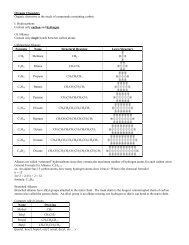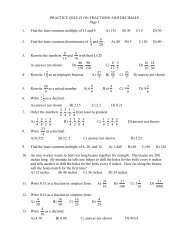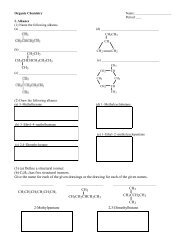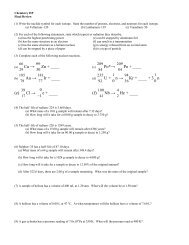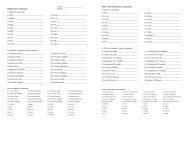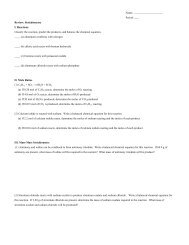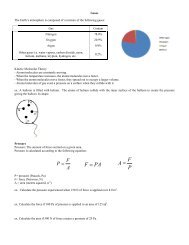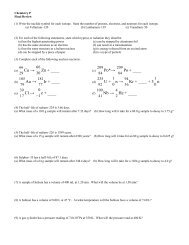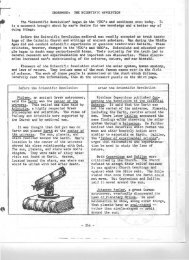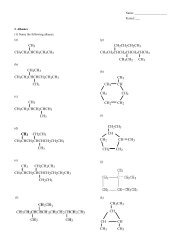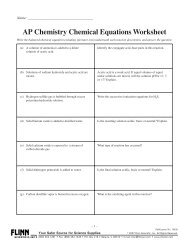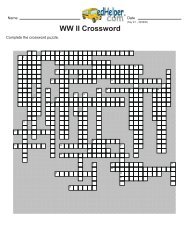A&S Acts – the Alien and Sedition Acts, which the DRs had opposed from the start, were letexpire in 1801 and 1802. Jefferson also refused to use the acts against his opponents, andpardoned all those indicted under the acts during the Adams administration. Naturalization Act of 1802 – this replaced the Naturalization Act of 1798, setting therequirement for citizenship back to 5 years only [most immigrants were DRs]. Debt Reduction – Secretary of the Treasury Albert Gallatin cut the army budget in _ and alsocut back on the navy in an effort to reduce the nat’l debt, which he predicted would be retiredby 1817 with his plan. Unlike Hamilton, who saw the debt as a source of economic growth,Jefferson felt it was only the source of gov’t corruption. No Internal Taxes – all internal taxes, including the Whiskey Tax, were repealed.- Then there was the war w/the Judiciary, the last area of gov’t the Federalists still controlled, partially b/c ofAdams’ “midnight judges.”- In fact, the first problem related to the Judiciary Act of 1801, which created the 15 new judgeships Adamsthen filled w/Federalists and reduced the # of judges in the SC to 5 in order to deny Jefferson the privilege ofchoosing another judge. So, the DR Congress repealed the act, and Jefferson got to choose his judge.- Then DRs began trying to remove opposition judges, starting w/an old drunk guy, Judge John Pickering,who actually was impeached. Then the House tried to impeach Federalist SC Justice Samuel Chase forjudicial misconduct [he prosecuted people under the Sedition Act], but he was acquitted, setting theprecedent that only criminal acts could lead to impeachment.- The SC, b/c of Federalist Chief Justice John Marshall, continued to uphold federal over states’ rights andprotect business interests, even after the DRs became a majority in 1811. Marshall was also responsible forelevating the stature of the judicial branch, especially through Marbury v. Madison (1803), where Marshallgave up the right to issue writs of mandamus in return for the greater power of judicial review [power of SCto rule state and federal laws unconstitutional and get rid of them].*The Louisiana Purchase*- Louisiana was a key area b/c the nation that controlled it automatically controlled New Orleans, which wasa center for trading up and down the Mississippi River. So, the US preferred that the Spanish [weakerpower], who had acquired the territory from France in 1763, have the area.- In 1800 and 1801, however, France once again obtained control of the region. Oh no! Concerns grewwhen, right before giving the area to France, Spanish officials stopped letting <strong>Am</strong>ericans keep their goods inNO while waiting for their shipment to other countries.- Jefferson responded by preparing for war and sending James Monroe to join Robert Livingston in France.Their goal: to buy NO. But they got a heck of a lot more than they bargained for when in April 1803Napoleon offered the whole deal to the US for $15 million [needed the $].- Strategically, the deal was a major dream, but there was the ever-annoying question: was it Constitutionalfor Jefferson to buy the land [didn’t say in Constitution that Presidents could buy land]? Jefferson consideredamending the Constitution for it, but decided the President’s implied powers were enough. Besides, as anexpansionist, it was just too good to pass up.- In May 1804 Jefferson sent out Meriwether Lewis and William Clark to map the territory and go all theway to the Pacific Coast. L&C led the Corps of Discovery, which was a rather diverse group consisting ofarmy regulars, young adventurer-wannabes, and Indian guides added along the way [Sacagawea]. Thegroup arrived back home on September 23, 1806, bringing with them an extensive knowledge of the flora,fauna and peoples of the West.- Other explorations, like the one led by Zebulon Pike, which explored the Southwest, followed, eventuallyleading to the creation of the Santa Fe Trail in the 1820s and the beginning of US settlement in Texas.*Indian Resistance*- The craze for expansion set off by the Louisiana Purchase certainly did not bode well for the Indians, who,due to continual land losses, were finding their traditional lifestyles difficult to maintain [disease was also abig problem].- So in the early 1800s 2 Shawnee brothers, Prophet and Tecumseh led a revolt against <strong>Am</strong>ericanencroachment by creating a pan-Indian federation. Prophet, who claimed to have been born again, beganthe movement w/a religious POV by stressing a return to traditional moral values [no more alcohol].- But by 1808 the pair, encouraged by the alliance-eager British to resist <strong>Am</strong>erican land claims, was talkingmore about <strong>Am</strong>erican aggression than about religion. Tecumseh took over and began traveling about tounify Indians in resistance against the <strong>Am</strong>ericans.- Tecumseh led the Indians [who became British allies] against the <strong>Am</strong>ericans in the War of 1812 until hisdeath at the Battle of the Thames, which marked the end of Indian unity.22
*Political Factionalism and Jefferson’s Reelection*- Before the DR victory in 1800, Federalists objected to popular campaigning. After their loss, however, anew generation of Federalists began imitating their rivals, attacking the DRs for being autocratic Southernplanters and stimulating fears of an overly weak army and navy.- Competition between Federalists and DRs led to increasing participation in government, and grassrootscampaigning efforts really began taking root [political BBQs].- Since most Federalist never really got the hang of popular campaigning, the Federalists were weak at henat’l level. Extremists like Timothy Pickering, who suggested the secession of NE in 1803/1804 [plan neverworked b/c co-conspirator Burr wasn’t elected NY Governor], did not help the Federalist position.- When DRs weren’t busy fighting Feds they fought among themselves. The Hamilton-Burr Duel illustratesthe explosiveness of the era’s personal/political conflicts, but is *surprisingly* the only example where thesituation deteriorated to the point to actual violence.- On to the Presidential Election of 1804: Jefferson and Clinton [NY Governor] totally creamed CharlesPinckney and Rufus King [also of NY]. Jefferson campaigned by taking credit for the return of republicanvalues and for the Louisiana Purchase.*Prelude to the War of 1812*- Jefferson’s goals included non-involvement w/European conflicts – in this, he was successful until 1805.After that, <strong>Am</strong>erican <strong>com</strong>mercial ties made it impossible to avoid entanglement in the European conflicts ofthe time.- It all began with the renewal of the Napoleonic Wars in Europe in May 1803 [by then the US and Britainonce again had friendly relationships]. This helped US <strong>com</strong>merce for 2 years, since it allowed <strong>Am</strong>erica tobe<strong>com</strong>e the chief supplier of food the Europe.- But after the British victory at the Battle of Trafalgar in October 1805 the Royal Navy tightened its control,a situation that worsened when Britain and France began blockading e/o trade to break the stalemate. Thiswas terrible for US trade.- The British then began violating US rights as a sovereign nation by: (1) impressing British-born sailors orBritish deserters on US ships and court-martialing alleged deserters, (2) interfering w/US trade in the WestIndies and (3) searching and seizing US ships.- So in February 1806 Congress passed the Non-Importation Act, which banned British manufacturesfrom entering <strong>Am</strong>erican ports, to protest British impressment. The act was more a warning than anythingelse, as it didn’t ban the really important goods.- Still, after failed attempts at negotiation the US-British relationship went down the drain, especially after theChesapeake affair in June 1807. Inside US waters, the British ship Leopard fired on the Chesapeake after itrefused to be searched for deserters. The ship was then boarded and four men were seized.- This enraged <strong>Am</strong>ericans but also illustrated US military weakness, which prevented war. Instead, Jeffersonclosed <strong>Am</strong>erican waters to the British, increased military spending, invoked the Non-Importation Act inDecember 1807 and then followed with the Embargo Act.- A short-term measure meant to avoid war, the Embargo Act forbade all US exports to other countries. Thiswas a majorly bad move b/c: (1) it killed the US economy (high unemployment), esp. in NE and led tosmuggling, (2) it did not really hurt Britain overall as the people it affected (factory workers) had no role ingov’t, (3) it did not really hurt France b/c there was already was British blockade on Europe. Its only positiveeffect was that it encouraged domestic manufacturing.- Then *perfect timing* came the Presidential Election of 1808. James Madison ran for the DRs (though hisnomination was contested in the party’s congressional caucus by James Monroe) and Pinckney and Kingonce again ran for the Federalists. This time the Federalists had more of a chance [Embargo Act], andactually gained some seats in Congress.- Madison replaced the embargo with the Non-Intercourse Act of 1809, which reopened trade w/all exceptfor Britain and France and promised if either country stopped violating US rights they would open tradew/them again. This fixed the EA problems but not the original ones.- In 1810 the NIA was replaced by Macon’s Bill #2, which reopened trade with all countries and promisedthat if either Br./Fr. Stopped violating US rights the US would stop trading w/the other nation. Napoleon saidsure, Madison <strong>com</strong>plied, but the French didn’t stop. This foreign policy stuff sure isn’t easy, Mr. Madison.*The War of 1812*- Even though the US military situation certainly left something to be desired, by 1812, war seemed almostinevitable due to constant violation of US rights in the seas.- Anyhow, first there was the Presidential Election of 1812, which was somewhat of a referendum on thewhole war thing. Madison was reelected.23
- Page 3 and 4: Congregationalists (Puritans) - The
- Page 5 and 6: - So the Restoration Colonies, form
- Page 7 and 8: - So in England, where they were lo
- Page 9 and 10: *Colonial Politics 1700-1750: Relat
- Page 11 and 12: - Another ideology that was beginni
- Page 13 and 14: - The Quebec Acts were passed aroun
- Page 15 and 16: - So, by 1782, what had seemed to b
- Page 17 and 18: on the economic side, since the gov
- Page 19 and 20: - Anyway, Congress had several ques
- Page 21: - Adams was still in the early Wash
- Page 25 and 26: - Samuel Slater set up the first te
- Page 27 and 28: - Court rulings extended the powers
- Page 29 and 30: Revival, Reform and Politics during
- Page 31 and 32: - Anyhow, during his administration
- Page 33 and 34: TEXAS (Southerners) - Texas had bee
- Page 35 and 36: - Anyhow, Pierce’s total support
- Page 37 and 38: They had a smaller everything: smal
- Page 39 and 40: - The two Northern victories at the
- Page 41 and 42: - The result was the Fourteenth Ame
- Page 43 and 44: The Slaughter-House Cases (1873) -
- Page 45 and 46: in the arrest of 8 immigrant radica
- Page 47 and 48: case (1897 - ICC can’t set rates)
- Page 49 and 50: - The Populists prepared to run aga
- Page 51 and 52: - MOST IMPORTANTLY, though, was the
- Page 53 and 54: - So, what led the US to undertake
- Page 55 and 56: - The rebellion, led by Emilio Agui
- Page 57 and 58: - Still, Americans managed to turn
- Page 59 and 60: - So - the point of this episode? B
- Page 62 and 63: *Hoover’s Response*- Poor Herbert
- Page 64 and 65: - In FDR’s second term, however,
- Page 66 and 67: Dominican Republic - When we left i
- Page 68 and 69: World War II (1941 - 1945)*The Cour
- Page 70 and 71: - So Truman started off again all c
- Page 72 and 73:
- First of all, the 1950s were (for
- Page 74 and 75:
peace w/Japan that ended occupation
- Page 76:
- France wanted out, so at the Gene



